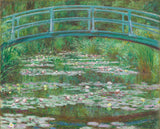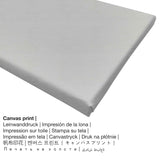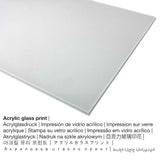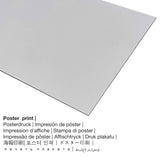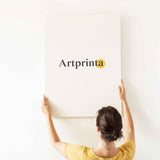Claude Monet, 1899 - The Japanese Footbridge - fine art print
Tax included. Shipping calculated at checkout.
Additional artwork information from National Gallery of Art (© Copyright - by National Gallery of Art - National Gallery of Art)
In 1883 Monet moved his household, his two sons along with Alice Hoschedé and her children, to the rural community of Giverny, where he leased a house that he was able to purchase seven years later. In early 1893, he acquired a swampy area across the railroad tracks abutting his property and petitioned the village council for permission to divert a small stream into it. But it was only toward the end of that decade that he turned to the garden he had created there as a rich source of artistic inspiration.
In 1899, Monet painted 12 works from a single vantage point, focusing on the arching blue–green bridge and the microcosm of his water garden. Among the 12 works was the National Gallery's Japanese Footbridge. Monet designed and built the landscape that appears in the painting—from the bridge to the pond and its shape, to the water lilies and other plantings. The artist, who as a leader of the impressionists had espoused the spontaneity of directly observed works that capture the fleeting effects of light and color, had in these later paintings subjected a nature he re–created to sustained, meditated scrutiny.
When Monet exhibited these paintings at Durand–Ruel's gallery in 1890, a number of critics mentioned his debt to Japanese art. More telling, the impenetrable green enclosure—heightened in the National Gallery painting by the placement of the top of the bridge's arch just below the painting's top edge—harkens back to the hortus conclusus (closed garden) of medieval images, while also evoking a dreamlike contemplative zone consonant with symbolist literature, especially poems such as "Le Nénuphar blanc" by Stéphane Mallarmé. Gustave Geffroy described this effect in his review of the exhibition (Le Journal, November 26, 1900), speaking of "this minuscule pool where some mysterious corollas blossom," and "a calm pool, immobile, rigid, and deep like a mirror, upon which white water lilies blossom forth, a pool surrounded by soft and hanging greenery which reflects itself in it."
Background information about the unique artpiece
| Work of art title: | "The Japanese Footbridge" |
| Categorization: | painting |
| Umbrella term: | modern art |
| Time: | 19th century |
| Artpiece year: | 1899 |
| Artwork age: | around 120 years |
| Original medium of artwork: | oil on canvas |
| Artwork original dimensions: | 81,3 x 101,6 cm (32 x 40 in) |
| Museum: | National Gallery of Art |
| Place of museum: | Washington D.C., United States of America |
| Museum website: | National Gallery of Art |
| License type of artwork: | public domain |
| Courtesy of: | National Gallery of Art, Washington |
The artist
| Name of the artist: | Claude Monet |
| Aliases: | monet claude, Monet Claude, Claude Monet, Mone Klod, Monet Oscar Claude, Monet Claude Jean, Monet, Claude Oscar Monet, Monet Claude Oscar, Monet Oscar-Claude, מונה קלוד, C. Monet, monet c., Cl. Monet, Monet Claude-Oscar |
| Gender: | male |
| Nationality: | French |
| Jobs: | painter |
| Country: | France |
| Artist category: | modern artist |
| Art styles: | Impressionism |
| Died at the age of: | 86 years |
| Born: | 1840 |
| Place of birth: | Paris, Ile-de-France, France |
| Died: | 1926 |
| Town of death: | Giverny, Normandie, France |
About this item
| Product categorization: | fine art reproduction |
| Reproduction: | reproduction in digital format |
| Production method: | digital printing |
| Origin of the product: | produced in Germany |
| Stock type: | on demand production |
| Intended product usage: | home décor, art reproduction gallery |
| Orientation of the artwork: | landscape format |
| Image ratio: | 1.2 : 1 |
| Image aspect ratio meaning: | the length is 20% longer than the width |
| Fabric options: | poster print (canvas paper), canvas print, metal print (aluminium dibond), acrylic glass print (with real glass coating) |
| Canvas print (canvas on stretcher frame) size variants: | 60x50cm - 24x20", 120x100cm - 47x39", 180x150cm - 71x59" |
| Acrylic glass print (with real glass coating): | 60x50cm - 24x20", 120x100cm - 47x39", 180x150cm - 71x59" |
| Poster print (canvas paper) variants: | 60x50cm - 24x20", 120x100cm - 47x39" |
| Aluminium dibond print options: | 60x50cm - 24x20", 120x100cm - 47x39" |
| Framing of the art reproduction: | without frame |
Select the product material you will hang up on your walls
For every art print we offer different materials & sizes. We allow yout to choose among the following variants:
- Aluminium print (aluminium dibond): These are metal prints on alu dibond material with an outstanding depth effect. A non-reflective surface creates a contemporary impression. A direct Aluminium Dibond Print is the excellent start to reproductions manufactured on alu. For the Direct Aluminium Dibond option, we print the favorite artwork onto the surface of the aluminum composite. Colors are luminous, fine details appear very clear. The direct UV print on aluminium is the most popular entry-level product and is a stylish way to display art prints, as it puts the viewer’s focus on the artwork.
- Poster (canvas material): The Artprinta poster print is a UV printed canvas paper with a nice finish on the surface. Please note, that depending on the absolute size of the poster we add a white margin of something between 2 - 6cm around the print, which facilitates the framing with a custom frame.
- Acrylic glass print (with real glass coating): The acrylic glass print, which is often described as a plexiglass print, will turn the artwork into great wall decoration and offers a good alternative to dibond and canvas prints. Your own copy of the work of art will be custom-made with the help of modern UV direct printing technology.
- The canvas print: A canvas print is a printed canvas stretched on a wood frame. The canvas produces a lively, appealing look. The great advantage of canvas prints is that they are relatively low in weight, which means that it is easy to hang up your Canvas print without any wall-mounts. A canvas print is suitable for all types of walls.
In 1899 Claude Monet created the piece of art. The version of the piece of art was painted with the size - 81,3 x 101,6 cm (32 x 40 in) and was manufactured with the techinque of oil on canvas. Furthermore, the work of art is in the the National Gallery of Art's art collection located in Washington D.C., United States of America. The modern art artwork, which belongs to the public domain is being provided with courtesy of National Gallery of Art, Washington.Creditline of the artwork: . Besides, the alignment is in landscape format with a side ratio of 1.2 : 1, which means that the length is 20% longer than the width. The painter Claude Monet was an artist from France, whose artistic style can mainly be classified as Impressionism. The Impressionist artist was born in 1840 in Paris, Ile-de-France, France and passed away at the age of 86 in the year 1926.
Important note: We try our best in order to describe our products in as much detail as possible and to demonstrate them visually. Please bear in mind that the pigments of the printed materials, as well as the print result may vary marginally from the presentation on the device's monitor. Depending on the screen settings and the condition of the surface, not all colors will be printed one hundret percent realistically. Since the art reproductions are processed and printed by hand, there might also be slight differences in the size and exact position of the motif.
© Copyrighted by - Artprinta.com

